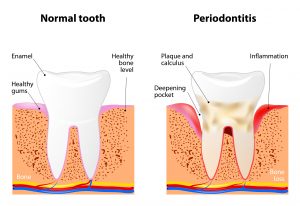November 30, 2017
Almost half of the American adult population has some form of periodontal disease. Without proper treatment, gum disease can lead to tooth decay, missing teeth and other problems. There are certain risk factors that increase your chance of developing it, including having diabetes and poor oral hygiene. Many patients who avoid going to the dentist or periodontist find that by the time they finally do go, they have advanced periodontal disease. This can lead to fear about needing to undergo painful or uncomfortable treatments such as gum grafts. However, Dr. Miner offers another option: laser gum therapy.
What Is Laser Gum Therapy?
As its name implies, this type of therapy utilizes lasers to correct gum disease rather than relying on the traditional scaling and root planning, which cleans the root and tooth surface to prevent infections and decay, as well as promote regeneration of gum tissue. In many stages of gum disease, the tissue becomes inflamed. With laser therapy, the dentist or periodontist uses a laser to remove this infected tissue to allow for scaling of the root. This removes any plaque that might be built up. Then, rough spots are smoothed out to prevent infections and promote healing.
What Are the Benefits?
Many patients prefer laser gum therapy because it is a minimally invasive procedure with reduced recovery times. It has more precision and accuracy, which prevents damage to healthy teeth. Patients experience less swelling, pain and bleeding as well. The procedure and the recovery are much more comfortable, making many patients more amenable to undergoing this type of treatment.
Schedule a Consultation Today
If you’ve noticed you have some of the symptoms of gum disease, contact our office and schedule an appointment with Dr. Mason Miner. He will assess your oral health and determine the best course of action to keep your mouth and teeth healthy. It is important to treat your periodontal disease as soon as possible to prevent some of the more serious complications, such as tooth decay and lost teeth.
